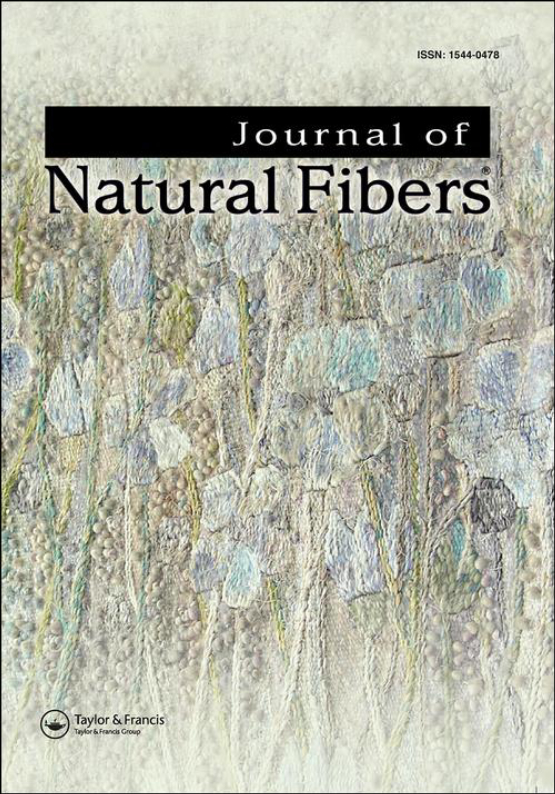Submit a Manuscript to the Journal
Journal of Natural Fibers
For an Article Collection on
Technological and Environmental Aspects of Agroindustrial Fiber Valorization
Manuscript deadline


Article collection guest advisor(s)
Martín Esteban González-López,
Tecnologico de Monterrey
martin.glez@tec.mx
Aida Alejandra Pérez-Fonseca,
Universidad de Guadalajara
aida.perez@academicos.udg.mx
Jorge Ramón Robledo-Ortíz,
Universidad de Guadalajara
jorge.robledo@academicos.udg.mx
Technological and Environmental Aspects of Agroindustrial Fiber Valorization
Natural fibers have received widespread attention as replacements for synthetic fibers in many applications. This is driven by growing trends toward a circular economy and the need to reduce the environmental impact associated with the production and processing of synthetic fibers. In some cases, pristine natural fibers are developed from scratch for specific applications, resulting in good, tailor-made properties but potentially incurring a high carbon footprint during production. In contrast, waste natural fibers, generated as by-products of agro-industrial processes, have proven to be a viable alternative. Although these fibers require specific pre-treatments depending on the application, their valorization pathways often result in environmental benefits. This approach not only supports the development of new value-added products but also offers a sustainable solution for managing agro-industrial waste from a circular economy perspective.
Typical valorization pathways include waste-to-product, waste-to-food, and waste-to-energy approaches. The selection of a specific waste valorization route often depends on multiple factors, including technical, economic, and environmental indicators. Decision-making is supported by tools such as life cycle assessment; however, feedstocks from developing countries or rising agro-industrial processes are frequently underrepresented. Moreover, existing databases often lack the resolution and specificity needed to accurately assess these materials. Additionally, researchers sometimes fail to collect first-hand data that accurately reflects the current state of waste management. The absence of comprehensive technological analyses and environmental assessments that consider economic viability in the literature on the valorization of residual natural fibers remains one of the major barriers to scaling up these technologies. The absence of comprehensive technological analyses and environmental assessments that consider economic viability in the literature on the valorization of residual natural fibers remains one of the major barriers to scaling up these technologies.
This Article Collection encourages the scientific community to present state-of-the-art research on the science and technology behind economically viable valorization strategies for residual agro-industrial waste. These strategies include, but are not limited to, surface treatments for producing natural fiber-reinforced composites, anaerobic digestion for energy production, and biotechnological approaches for generating high-protein biomass and bio-based materials. Most importantly, this Collection emphasizes the need to support scientific findings with decision-making indicators—such as life cycle assessment, or technoeconomic analyses—to effectively promote the adoption of these technologies within the industrial sector.
Keywords:
- Waste fibers
- Circular economy
- Valorization
- Life cycle assessment
- Carbon footprint
All manuscripts submitted to this Article Collection will undergo a full peer-review; the Guest Advisor for this Collection will not be handling the manuscripts (unless they are an Editorial Board member).
Please review the journal scope and author submission instructions prior to submitting a manuscript.
The deadline for submitting manuscripts is April 3, 2026.
Please contact Commissioning Editor Kara Roberts at Kara.Roberts@taylorandfrancis.com with any queries and discount codes regarding this Article Collection.
Please be sure to select the appropriate Article Collection from the drop-down menu in the submission system.
Dr. Martín Esteban González López is a Chemical Engineer and professor at Tecnológico de Monterrey, specializing in sustainability and climate change. His research focuses on biodegradable materials from lignocellulosic waste, anaerobic digestion of agroindustrial waste, and water treatment technologies. He has led projects on AI-based water monitoring and life cycle analysis in circular bioeconomy systems, and has published over 40 articles in international journals.
Dr. Aida Alejandra Pérez Fonseca is a chemical engineer with a master’s degree and Ph.D. in Chemical Engineering from the University of Guadalajara, where she currently works as a full-time research professor. She completed a postdoctoral stay at Laval University in Canada. Dr. Pérez Fonseca has published 46 articles in international journals. Her research focuses on polymeric and biopolymeric materials, including their synthesis, characterization, and environmental applications.
Dr. Jorge R. Robledo-Ortíz earned his bachelor’s, master’s, and Ph.D. degrees in Chemical Engineering from the University of Guadalajara, where he is currently a professor in the Department of Wood, Cellulose, and Paper. His research focuses on the processing, characterization, and application of polymeric and biopolymeric materials. He has published over 80 indexed articles. Dr. Robledo-Ortíz has received several recognitions for his academic work and has supervised numerous undergraduate and graduate theses.
Guest Advisors declare no potential conflicts of interests in line with our Editorial Policies.
Benefits of publishing open access within Taylor & Francis
Global marketing and publicity, ensuring your research reaches the people you want it to.
Article Collections bring together the latest research on hot topics from influential researchers across the globe.
Rigorous peer review for every open access article.
Rapid online publication allowing you to share your work quickly.
Submission Instructions
All manuscripts submitted to this Article Collection will undergo desk assessment and peer-review as part of our standard editorial process. Guest Advisors for this collection will not be involved in peer-reviewing manuscripts unless they are an existing member of the Editorial Board. Please review the journal Aims and Scope and author submission instructions prior to submitting a manuscript.
